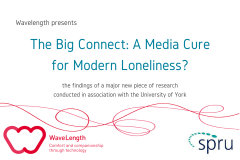 This March we launched the findings of a major new piece of research conducted in association with the University of York. We wanted to explore the social, economic and health impacts that our work has had on our beneficiaries.
This March we launched the findings of a major new piece of research conducted in association with the University of York. We wanted to explore the social, economic and health impacts that our work has had on our beneficiaries.
Researchers from York interviewed people across the country to find out how media technology had changed their lives. The interviewees were disabled, homeless and vulnerable people who had previously suffered from loneliness and social isolation. They had all received radios, TVs or tablet computers from WaveLength to help them overcome their loneliness. The research was led by Dr Annie Irvine and Professor Martin Webber.
What did the research show?
They found that media technology helps to reduce loneliness in three ways:
- Providing comfort and companionship, alleviating loneliness and the negative emotions that can bring
- Reducing social isolation, bringing people into contact with others and helping them build social connections
- Granting access to information and inspiration, from advice on emotional wellbeing and mental health to details of social opportunities or job vacancies.
Participants also reported that technology lifted low moods and increased their motivation.
Professor Martin Webber is Director at York’s International Centre for Mental Health Social Research. He said: “This study found that recipients of media technology reported that it helped to alleviate loneliness and social isolation, in addition to a wide range of other positive impacts on their lives.”
WaveLength’s CEO Tim Leech said: “This report challenges the idea that technology is bad for us. Instead, we have found that it can help to improve the physical and mental wellbeing of the nation. The benefits of media technology are cross-spectrum: it can bring about positive outcomes for young people, elderly people and everyone in between. This area needs to be better understood and explored, so we are calling for funders to support our on-going research into the power of technology to alleviate social isolation.”
To download the full report, click here.
To read a summary of our findings, click here.
Big Connect summary findings, 2018
